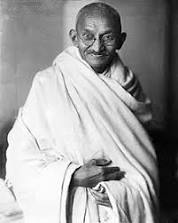Mohandas Karamchand Gandhi Biography and Works.

Mohandas Karamchand Gandhi (October 2, 1869 – January 30, 1948) was the pre-eminent political and ideological leader of India during the Indian Independence Movement.
A pioneer of satyagraha, or resistance to tyranny through Mass Civil Disobedience a philosophy firmly founded upon ahimsa, or total non violence – Gandhi led India to independence and inspired movements for civil rights and freedom across the world.
Gandhi is often referred to as the Mahatma or the “Great Soul,” an honorific first applied to him by Rabindranath Tagore. In India, he is also called Bapu and officially honoured as the Father of the Nation. His birthday, October 2, is commemorated in India as Gandhi Jayanti, a national holiday, and worldwide as the International Day of Non-Violence’.
Gandhi first employed non-violent civil disobedience as an expatriate lawyer in South Africa, in the resident Indian community’s struggle for civil rights.
After his return to India in 1915, he set about organizing peasants, farmers, and urban labourers in protesting excessive land-tax and discrimination. Assuming leadership of the Indian National Congress in 1921, Gandhi led nationwide campaigns for easing poverty, expanding women’s rights, building religious and ethnic amity, ending untouchability, increasing economic self reliance, but above all for achieving Swaraj – the independence of India from foreign domination. Gandhi famously led Indians in protesting the British imposed salt tax with the 400 km (250 miles) Dandi Salt March in 1930, and later in calling for the British to “Quit India’ in 1942.
Trivia
He was imprisoned for many years, on many occasions, in both South Africa and India.
- What is meant by Database Management System?
- Discuss the advantages and drawbacks of database.
- What do you mean by database ? Discuss its Characteristics.
- What is Data Mining?
- What are the conditions of communication?
- What do you mean by business communication ?
- organization / Differentiate between classical and modern theory of organization
- What is forecasting






